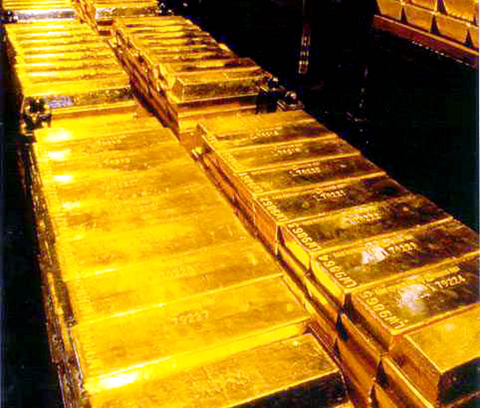The IMF said its executive board on Friday endorsed the sale of 403 tonnes of gold, worth an estimated US$13 billion, to boost lending capacity to poor countries.
The IMF said in a statement the sales would be “in a volume strictly limited to 403.3 metric tonnes, with these sales to be conducted under modalities that safeguard against disruption of the gold market.”
The 186-nation institution said the decision was a core element of a new income model to make it less dependent on its lending revenue to cover expenses, such as surveillance of members’ economic and financial policies, that the board had approved in April last year.

PHOTO: AFP
The G20 key developed and developing countries, at their April summit in London, agreed the gold sales should allow the IMF to offer favorable conditions on loans to the poorest countries.
The IMF decision comes ahead of a two-day G20 summit in Pittsburgh, Pennsylvania, that will open on Thursday. Hosted by US President Barack Obama, leaders are to discuss efforts to recover from the worst global recession in six decades and financial regulatory reform.
“I am delighted that the executive board has given its overwhelming backing to a strictly limited sale of fund gold to put the financing of the IMF on a sound long-term footing, and enable us to step up much-needed concessional lending to the poorest countries,” IMF managing director Dominique Strauss-Kahn said in the statement.
“These sales will be conducted in a responsible and transparent manner that avoids disruption of the gold market,” he said.
The IMF head in an interview out yesterday urged G20 leaders to put tackling global imbalances near the top of their priorities. Dominique Strauss-Kahn told the Financial Times that the G20 must put “some steam” behind the issue.
The amount of gold to be sold is one-eighth of the 3,217 tonnes of gold currently held by the Washington-based IMF, the third-largest official holder of gold after the US and Germany. The fund is required by its founding document to conduct all gold sales at market prices.
The IMF did not state the value of the gold to be sold but based on the current bullish near-record market price for the metal, it is estimated the sale would fetch US$13 billion.
Under the approved plan, the IMF would offer to sell gold directly to central banks “or other official sector holders if there were to be interest from such holders.”
A prime candidate could be China, which is sitting on the world’s largest foreign exchange reserves, topping US$2 trillion, and has been seeking to diversify away from the dollar.
China early this month agreed to buy the first IMF bonds for about US$50 billion and has been on a gold-buying streak, increasing its gold reserves by 75 percent from 2003 to last year, official media showed.

‘SWASTICAR’: Tesla CEO Elon Musk’s close association with Donald Trump has prompted opponents to brand him a ‘Nazi’ and resulted in a dramatic drop in sales Demonstrators descended on Tesla Inc dealerships across the US, and in Europe and Canada on Saturday to protest company chief Elon Musk, who has amassed extraordinary power as a top adviser to US President Donald Trump. Waving signs with messages such as “Musk is stealing our money” and “Reclaim our country,” the protests largely took place peacefully following fiery episodes of vandalism on Tesla vehicles, dealerships and other facilities in recent weeks that US officials have denounced as terrorism. Hundreds rallied on Saturday outside the Tesla dealership in Manhattan. Some blasted Musk, the world’s richest man, while others demanded the shuttering of his

ADVERSARIES: The new list includes 11 entities in China and one in Taiwan, which is a local branch of Chinese cloud computing firm Inspur Group The US added dozens of entities to a trade blacklist on Tuesday, the US Department of Commerce said, in part to disrupt Beijing’s artificial intelligence (AI) and advanced computing capabilities. The action affects 80 entities from countries including China, the United Arab Emirates and Iran, with the commerce department citing their “activities contrary to US national security and foreign policy.” Those added to the “entity list” are restricted from obtaining US items and technologies without government authorization. “We will not allow adversaries to exploit American technology to bolster their own militaries and threaten American lives,” US Secretary of Commerce Howard Lutnick said. The entities

Minister of Finance Chuang Tsui-yun (莊翠雲) yesterday told lawmakers that she “would not speculate,” but a “response plan” has been prepared in case Taiwan is targeted by US President Donald Trump’s reciprocal tariffs, which are to be announced on Wednesday next week. The Trump administration, including US Secretary of the Treasury Scott Bessent, has said that much of the proposed reciprocal tariffs would focus on the 15 countries that have the highest trade surpluses with the US. Bessent has referred to those countries as the “dirty 15,” but has not named them. Last year, Taiwan’s US$73.9 billion trade surplus with the US

Prices of gasoline and diesel products at domestic gas stations are to fall NT$0.2 and NT$0.1 per liter respectively this week, even though international crude oil prices rose last week, CPC Corp, Taiwan (台灣中油) and Formosa Petrochemical Corp (台塑石化) said yesterday. International crude oil prices continued rising last week, as the US Energy Information Administration reported a larger-than-expected drop in US commercial crude oil inventories, CPC said in a statement. Based on the company’s floating oil price formula, the cost of crude oil rose 2.38 percent last week from a week earlier, it said. News that US President Donald Trump plans a “secondary